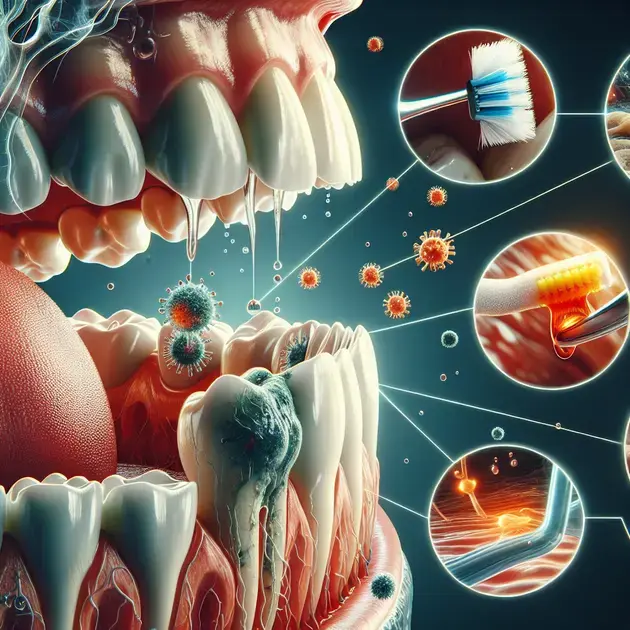Understanding the impact of dental plaque on oral health is crucial for maintaining a healthy smile. Dental plaque is a sticky, colorless film that constantly forms on your teeth. If not removed, it can lead to tooth decay, gum disease, and other oral health problems.
Recent studies have shown that the bacteria in dental plaque can also affect other areas of the body, increasing the risk of systemic diseases such as heart disease and diabetes. This highlights the importance of proper oral hygiene and regular dental check-ups to prevent the negative impact of dental plaque on overall health.

The Importance of Dental Plaque Awareness in Oral Health
Dental plaque is a sticky film that forms on the surface of teeth when bacteria in the mouth mix with saliva and food particles. It can lead to various oral health issues, including cavities, gum disease, and bad breath. It is crucial to raise awareness about dental plaque and its impact on oral health to encourage proper oral hygiene practices.
One of the best ways to prevent dental plaque build-up is by brushing your teeth at least twice a day with a fluoride toothpaste. Additionally, flossing daily can help remove plaque from areas that are difficult to reach with a toothbrush. Regular visits to the dentist for professional cleanings and check-ups are also essential in maintaining good oral health.
To increase awareness about dental plaque, educational resources are available online. Websites such as the American Dental Association (ADA) provide information about the causes of plaque build-up and tips for preventing it. Mobile apps like “My Dental Care” offer personalized oral health advice and reminders for daily brushing and flossing.
By staying informed about the importance of dental plaque awareness, individuals can take proactive steps to protect their oral health and prevent common dental problems associated with plaque accumulation.
Preventing Oral Health Complications Caused by Dental Plaque
Ignoring dental plaque can lead to serious oral health complications, such as tooth decay, gum inflammation, and even tooth loss. Prevention is key to avoiding these issues, and it starts with adopting a good oral hygiene routine.
First and foremost, brushing your teeth properly is crucial in removing plaque before it hardens into tartar. Using a soft-bristled toothbrush and gentle circular motions, brush all surfaces of your teeth for at least two minutes. Consider using an electric toothbrush, like the Philips Sonicare, which can be more effective at plaque removal.
In addition to brushing, flossing daily is essential for removing plaque and food particles between teeth. Water flossers, such as the Waterpik, can provide an alternative to traditional flossing and help clean hard-to-reach areas.
Regular dental check-ups play a significant role in preventing oral health complications caused by plaque. Dentists can detect early signs of gum disease and other issues related to plaque build-up. Apps like “Dental Monitoring” allow patients to track their oral health progress and communicate with their dentist remotely.
By taking proactive steps to prevent oral health complications caused by dental plaque, individuals can maintain healthy teeth and gums for years to come.
The Link Between Dental Plaque and Systemic Diseases
Recent research has shown a connection between oral health, specifically dental plaque, and systemic diseases such as heart disease, diabetes, and respiratory infections. The bacteria in dental plaque can enter the bloodstream and contribute to inflammation in other parts of the body, increasing the risk of developing these conditions.
To reduce the risk of systemic diseases linked to dental plaque, maintaining good oral hygiene is paramount. Alongside regular brushing and flossing, using an antimicrobial mouthwash like Listerine can help reduce the levels of bacteria in the mouth, lowering the risk of bacteria entering the bloodstream.
In addition to oral hygiene practices, a healthy diet plays a crucial role in preventing systemic diseases related to dental plaque. Consuming foods rich in vitamins and minerals, such as fruits and vegetables, can support overall oral and systemic health. Apps like “MyFitnessPal” can help users track their nutrient intake and make healthier food choices.
Regular exercise can also benefit oral and systemic health by reducing inflammation and improving circulation. Apps like “Nike Training Club” offer guided workout routines for users of all fitness levels, promoting overall well-being.
By understanding the link between dental plaque and systemic diseases, individuals can take proactive steps to protect their oral and overall health, reducing the risk of serious complications in the future.

Preventing Tooth Decay by Understanding Dental Plaque Formation
Dental plaque is a sticky, colorless film of bacteria that forms on teeth. Understanding how dental plaque forms is crucial in preventing tooth decay and other oral health issues. Plaque formation starts with the combination of food particles and saliva, creating an environment for bacteria to thrive. As these bacteria feed on sugars from food, they produce acids that erode tooth enamel, leading to cavities.
To prevent tooth decay caused by dental plaque formation, it is essential to maintain good oral hygiene practices. Brushing your teeth at least twice a day with fluoride toothpaste helps remove plaque buildup and prevents bacterial growth. Flossing daily is also crucial in cleaning hard-to-reach areas between teeth where plaque can accumulate.
In addition to regular oral hygiene practices, scheduling routine dental cleanings and check-ups with a dentist is important for preventing plaque formation. Professional cleanings can remove hardened plaque, known as tartar, that regular brushing and flossing may not be able to eliminate. Dentists can also assess your oral health and provide personalized recommendations to prevent tooth decay.
Another effective way to prevent dental plaque formation is to limit sugary and starchy foods in your diet. These foods can fuel bacteria in plaque, leading to increased acid production and a higher risk of tooth decay. Opt for a balanced diet rich in fruits, vegetables, and lean proteins to promote overall oral health and reduce the formation of plaque.
By understanding the process of dental plaque formation and implementing proper oral hygiene practices, you can effectively prevent tooth decay and maintain a healthy smile. Consistent care and preventive measures are key in reducing plaque buildup and protecting your teeth from decay and other oral health issues.
How Diet and Lifestyle Choices Influence Dental Plaque Build-Up
One of the key factors influencing dental plaque build-up is diet and lifestyle choices. Consuming sugary and acidic foods and beverages can contribute to the formation of plaque on teeth, as bacteria in plaque feed on sugars and produce acids that harm tooth enamel. Additionally, poor lifestyle habits such as smoking can also increase the risk of plaque accumulation and tooth decay.
To reduce the impact of diet and lifestyle choices on dental plaque build-up, it is important to make healthier food choices and avoid excessive consumption of sugary and acidic foods. Opt for water or milk instead of sugary beverages, and limit snacks high in sugar and carbohydrates. Maintaining a balanced diet rich in nutrients can support overall oral health and reduce the risk of plaque formation.
In addition to dietary changes, adopting good oral hygiene habits and regular dental visits are essential in combating dental plaque build-up. Brushing and flossing daily help remove plaque and prevent bacterial growth, while professional cleanings can address hard-to-reach areas and remove tartar buildup. Dentists can also provide guidance on lifestyle changes to improve oral health.
By making conscious choices regarding diet and lifestyle habits, you can actively influence the build-up of dental plaque and reduce the risk of tooth decay and other oral health issues. Prioritizing oral hygiene and healthy living can have a significant impact on your overall well-being and help maintain a bright and healthy smile.
Effective Strategies for Removing Dental Plaque at Home
When it comes to removing dental plaque at home, there are several effective strategies that can help maintain oral health and prevent tooth decay. One key step is to brush your teeth thoroughly at least twice a day using fluoride toothpaste. Brushing in gentle circular motions and focusing on all tooth surfaces can help remove plaque and prevent its accumulation.
In addition to brushing, daily flossing is crucial in removing plaque from between teeth where toothbrush bristles may not reach. Using dental floss or interdental brushes can help clean these areas and prevent plaque build-up. Mouthwash containing antibacterial ingredients can also be used as a supplementary step to help reduce plaque and freshen breath.
Another effective strategy for removing dental plaque at home is to incorporate interdental cleaning tools such as water flossers or air flossers into your oral hygiene routine. These devices use powerful jets of water or air to clean between teeth and along the gumline, removing plaque and debris. Regular use of these tools can complement brushing and flossing for more thorough plaque removal.
It is important to maintain a consistent oral hygiene routine and visit your dentist regularly for professional cleanings and check-ups. Dentists can provide guidance on proper oral care techniques and recommend personalized strategies for plaque removal based on your individual oral health needs. By combining at-home oral care with professional dental treatment, you can effectively remove plaque and protect your teeth from decay.
**
Conclusion
**
Understanding dental plaque formation is essential in preventing tooth decay and maintaining good oral health. Plaque, a sticky film of bacteria that can erode tooth enamel, forms when food particles combine with saliva, creating an environment for bacterial growth. To combat plaque build-up, it is crucial to adhere to proper oral hygiene practices such as brushing teeth twice daily with fluoride toothpaste and daily flossing to remove plaque and prevent cavities.
Moreover, diet and lifestyle choices play a significant role in dental plaque accumulation. Consuming sugary and acidic foods fuels bacteria in plaque, leading to increased acid production that harms teeth. Making healthier food choices, limiting sugary snacks, and opting for a balanced diet rich in nutrients can support overall oral health and reduce the risk of plaque formation.
Effective strategies for removing dental plaque at home include using interdental cleaning tools like water flossers, in addition to regular brushing and flossing. Professional dental cleanings and check-ups are also crucial for thorough plaque removal, as dentists can provide personalized recommendations and address areas that may be challenging to clean at home. By combining consistent at-home oral care with professional dental treatment, individuals can effectively remove plaque, prevent tooth decay, and safeguard their oral health.